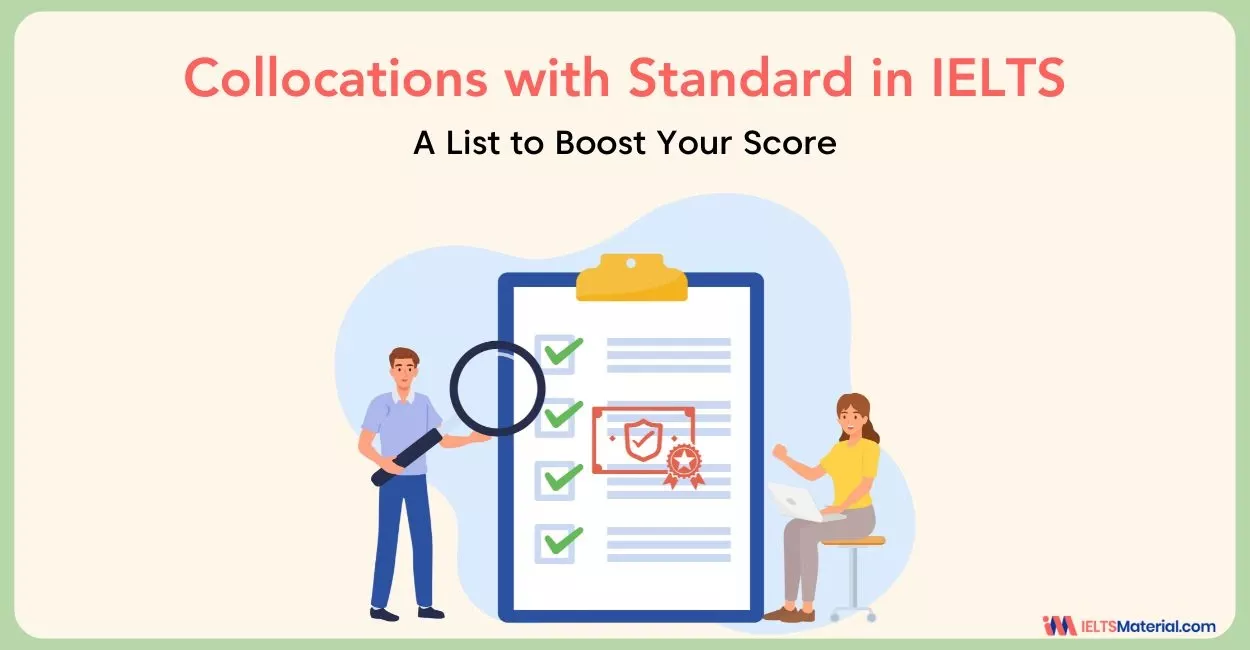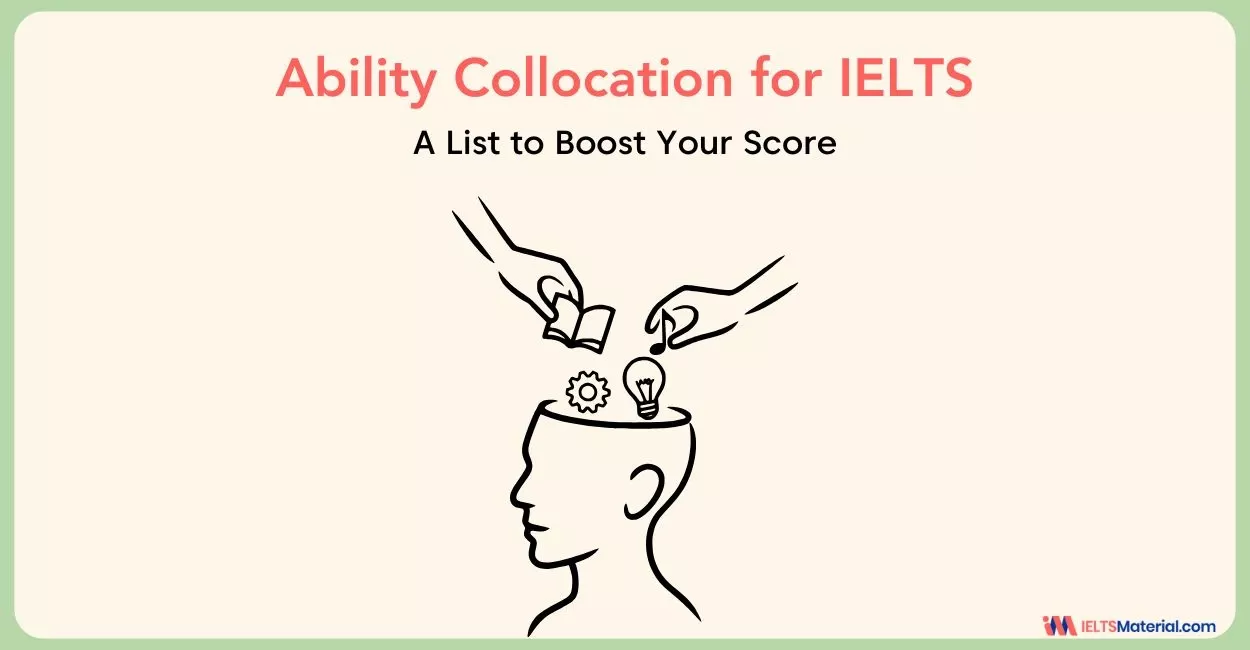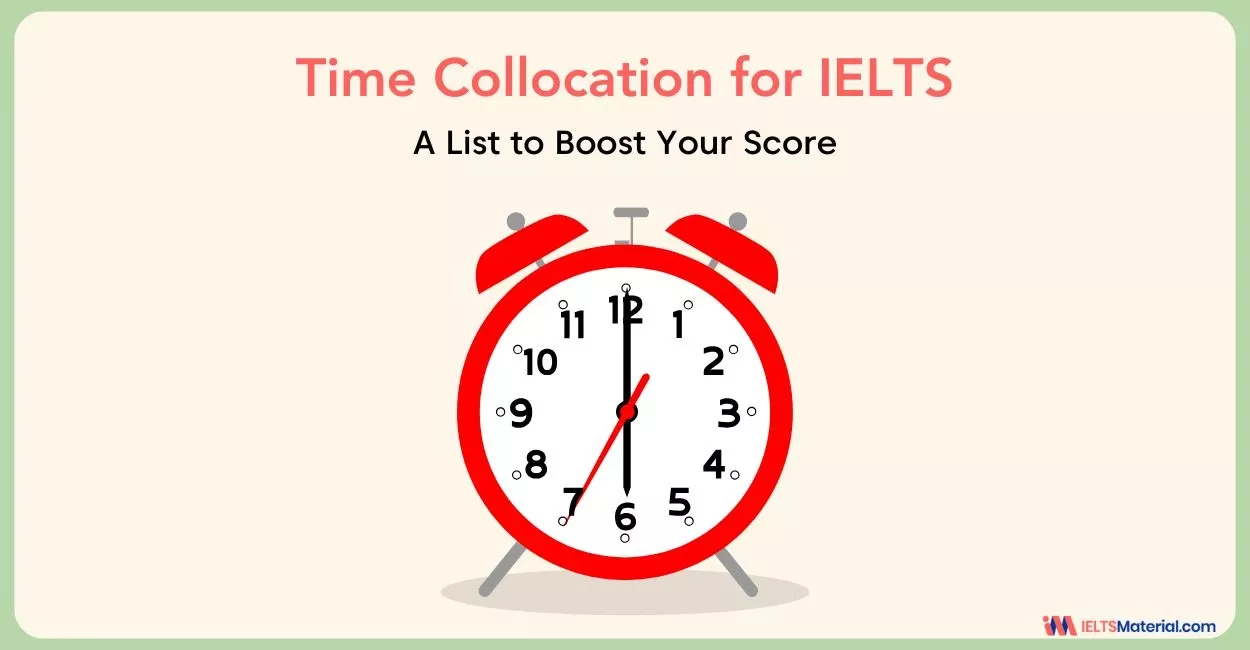Time Collocation for IELTS: A List to Boost Your Score
9 min read
Updated On
-
Copy link
Boost your IELTS vocabulary with expert guidance on time collocations for Band 9. This blog explains meanings, provides examples, and includes interesting exercises to enhance your writing precision, speaking confidence, and overall IELTS score potential.
Table of Contents

Limited-Time Offer : Access a FREE 10-Day IELTS Study Plan!
Time is one of the most fundamental yet flexible nouns in English. It’s used to describe experiences, schedules, opportunities, and life stages - all of which appear frequently in IELTS Writing and Speaking. So, the time collocations for IELTS show not just vocabulary knowledge but also collocational accuracy, a key feature of Band 8+ language use.
In this blog, we will explore different time collocations, categorized into verbs, adjectives, and other useful combinations, to help you enrich your overall IELTS vocabulary.
Lists of Time Collocations for IELTS to Boost Your Score
Whether you are writing about time management, leisure activities, or technology saving time, using accurate and advanced time collocations for IELTS can dramatically enhance your lexical range and naturalness.
Therefore, explore the lists of the top important collocations for IELTS related to time in the tables below, including their meanings and example sentences.
Verb + Time Collocations
Certain verbs naturally combine with ‘time’ to express how it is used, saved, or wasted. These are quite useful in IELTS Writing Task 2 essays about work-life balance, technology, and productivity.
|
Verb + Time |
Meaning |
Example Sentence |
|---|---|---|
|
Afford time |
to have enough time available |
Busy professionals often can’t afford time for exercise. |
|
Kill time |
to spend time doing something unimportant while waiting |
I read magazines to kill time at the airport. |
|
Make time |
to find time for something important |
It’s essential to make time for relaxation. |
|
Save time |
to reduce the amount of time needed |
Online shopping helps save time for working people. |
|
Spend time |
to use time for a particular purpose |
Students should spend more time reading newspapers. |
|
Take time |
to require a certain amount of time |
Learning a new language takes time and patience. |
|
Waste time |
to use time unproductively |
People often waste time scrolling through social media. |
|
Value time |
to appreciate the importance of time |
Successful people value time as their most precious asset. |
|
Lose time |
to fall behind schedule |
We lost time due to traffic congestion. |
Noun + of + Time Collocations
These structures describe quantities, durations, or qualities of time, making your sentences more academic and specific, perfect for a high IELTS band score.
|
Noun + of + Time |
Meaning |
Example Sentence |
|---|---|---|
|
Amount of time |
quantity of time |
Students spend a large amount of time preparing for exams. |
|
Course of time |
over a period of time |
Attitudes toward gender equality have changed over the course of time. |
|
Length of time |
duration |
The length of time required for the project was underestimated. |
|
Matter of time |
something inevitable that will happen soon |
It’s only a matter of time before electric cars become mainstream. |
|
Space of time |
a short or limited duration |
In a short space of time, technology has revolutionized communication. |
|
Waste of time |
something not worth doing |
Arguing about trivial issues is a complete waste of time. |
|
Period of time |
a continuous stretch of time |
Many students study abroad for a period of time. |
|
Moment of time |
a specific instant |
That moment of time changed her life forever. |
Common Adjective + Time Collocations
Adjectives help describe the quality or type of time. These are useful in IELTS Speaking (Part 2 stories or Part 3 discussions) and Writing Task 2 essays related to lifestyle, leisure, or work.
|
Adjective + Time |
Meaning |
Example Sentence |
|---|---|---|
|
Convenient time |
a suitable or appropriate moment |
Please call me at a convenient time. |
|
Quality time |
time spent meaningfully with loved ones |
Parents should spend quality time with their children. |
|
Smashing time (informal) |
an excellent or enjoyable time |
We had a smashing time on our holiday. |
|
Spare time |
free or leisure time |
I like to read novels in my spare time. |
|
Ample time |
plenty of time available |
You should start early to have ample time for revision. |
|
Precious time |
valuable time that shouldn’t be wasted |
Commuting wastes precious time every day. |
|
Good time |
a pleasant or enjoyable period |
We had a good time at the festival. |
|
Rough time |
a difficult or challenging period |
Many people went through a rough time during the pandemic. |
|
Limited time |
a short or restricted period |
We have limited time to finish the task. |
|
Perfect time |
the best or ideal moment |
This is the perfect time to apply for scholarships. |
Expressions of Time
These are fixed expressions that make your speech sound natural and idiomatic. They are essential for IELTS Speaking fluency and Writing variety.
|
Expression |
Meaning |
Example Sentence |
|---|---|---|
|
The whole time |
throughout the entire period |
She was smiling the whole time. |
|
The first time |
when something happens initially |
The first time I travelled abroad was unforgettable. |
|
Next time |
on a future occasion |
I’ll be more careful next time. |
|
My usual time |
the regular or habitual moment |
I wake up at my usual time, around 6 a.m. |
|
A specific time |
a fixed or definite moment |
The interview will be held at a specific time tomorrow. |
|
Some time |
a period that is not defined exactly |
It took me some time to get used to living alone. |
|
At the right time |
when conditions are suitable |
You’ll succeed at the right time. |
|
In no time |
very quickly |
The children finished their homework in no time. |
|
At any time |
whenever possible |
You can contact customer support at any time. |
|
On time |
punctual |
Students are expected to arrive on time for their classes. |
Notes
|
Time Collocation for IELTS: Practice Exercises
We have put together a few exercises that you should take some time to solve to enhance your comprehension and use of the time collocations for the IELTS exam.
Exercise A: Use the correct form of these verbs.
|
afford kill make save spend take |
- It can ____________ quite a long time to get used to living in a different country.
- People who ____________ too much time together usually end up getting on each other’s nerves.
- It’ll take you about half an hour to walk to the station. Get a taxi. Think of the time you’ll____________ !
- I arrived two hours early for my interview, so I ____________ some time in the National Gallery and then I looked around a bookshop.
- You keep saying you don’t have enough time. That’s not good enough! You’ve simply got to ____________ time!
- I’d love to come out with you tonight, but I can’t ____________ the time. I have a report to finish for the morning.
Exercise B: Use these adjectives in the sentences.
|
convenient quality smashing spare ample precious good rough |
- We had a____________ time at Sarah’s party. Everybody really enjoyed themselves.
- She quit her job so that she could spend more ____________ time with her children.
- I enjoy gardening in my ____________ time. As soon as I go into the garden, I forget all about work.
- I’m sorry, I seem to have called at a bad time. When would be a____________ time to call back?
- She’s having a ____________ time at work. =>Yes, there’s talk of redundancies. And I think her boss has been giving her a difficult time.
- She claims that she didn’t have enough time to prepare for the interview, but like all other candidates we feel she had____________ time.
- Make sure you’re at the station in ____________ time. The train won’t wait for you! It leaves at 9, so the rest of us are going to be there at 8.45.
- Hurry up! You’re wasting ____________ time! We only have a few hours left!
Exercise C: Use these nouns in the sentences.
|
amount course length matter space waste |
- These meetings are a complete __________ of time. Nothing is ever decided!
- Children seem to spend an inordinate __________ of time watching TV – up to ten hours a day!
- This new strain of flu is out of control. It’s only a__________ of time before it arrives here.
- Standing on one leg for any __________ of time is quite difficult for most people.
- His injuries are severe but they will heal in the __________ of time. He just needs to be patient.
- Within a very short __________ of time he had lost his title. He was champion for under a month.
Exercise D: Use the following expressions in the sentences.
|
the whole time the first time next time my usual time a specific time some time |
- She kept on talking __________ ! She didn’t stop for a minute.
- The body had been in the water for __________ which made it difficult to determine the exact time of death.
- I met my girlfriend’s parents for __________ last week.
- Could we arrange __________ to discuss this problem? How about 10 tomorrow?
- I’d try a different approach __________ . You might be more successful.
- Although I was on holiday I still got up at __________ .
Time Collocations Answer Keys for Practice Exercises
Ex A: l. take 2.spend 3. save 4. killed / spent 5. make 6. afford
Ex B:
1 smashing 2. quality 3. spare 4. convenient
5 rough 6. ample 7. good 8. precious
Ex C:
1. waste 2. amount 3. matter 4. length 5. course 6. space
Ex D:
1 the whole time 2. some time 3. the first time
4 a specific time 5. next time 6. my usual time
To conclude, time is a universal concept, but the way you use it in English can make all the difference in your IELTS performance. By mastering time collocations for IELTS, you can transform ordinary sentences into polished, idiomatic expressions that impress examiners and demonstrate Band 8-level lexical control. So, next time you prepare for IELTS, do not just spend time memorizing vocabulary and adding it to your advanced vocabulary word list for IELTS; make time to learn how words truly work together.
Useful Links:

Start Preparing for IELTS: Get Your 10-Day Study Plan Today!
Learn more Collocations

Kasturika Samanta

Nehasri Ravishenbagam

Kasturika Samanta

Kasturika Samanta
Recent Articles

Nitika Gupt

Nehasri Ravishenbagam

Nehasri Ravishenbagam





Post your Comments